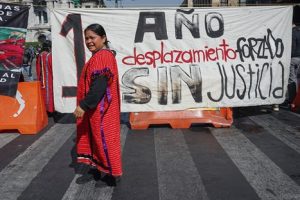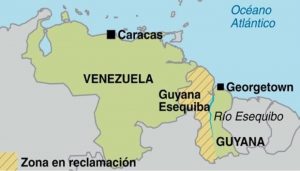By: Alexa Connaughton
Journal of Global Rights and Organizations Associate Articles Editor
SAN JOSE, Costa Rica – The IAHCR has recently released a resolution finding that Triqui families who were displaced from their villages are at “risk of irreparable damage to their rights” and requesting that the state of Mexico take precautionary measures to protect the displaced Triqui families.
 |
In December of 2020 a group of about 100 people, all part of a paramilitary group called MULTI (Triqui Struggle Unification Movement), attacked two Triqui villages, Tierra Blanca and Copala in Oaxaca, a state in southern Mexico. The attack started the morning of December 26th, when the paramilitary group began shooting into houses, killing, injuring, and kidnapping residents. Families were forced to flee in secret, resulting in the displacement of a total of 144 Triqui families. Some families were told to return to their homes, but no protection or preventative measures were offered by the government. Another attack occurred less than a month later. Following the December attack, there have been several instances of violence with little to no intervention by the government.
In 2020, it was estimated that approximately 4,077 indigenous people had been forcibly displaced from their home territories in Mexico. In Oaxaca alone, an estimated five indigenous communities were displaced, comprising 33 percent of the 4,077 total indigenous people. Meanwhile, 35 percent of the Triqui population has been displaced by violence.
Many of the Triqui families who were displaced went to the capital city of Oaxaca, Mexico City, and a nearby village of Yosoyuxi, where they have been living on the streets while they wait to be heard by authorities. Since the displacement in December of 2020, groups such as the MULTI have formed and conducted demonstrations and protests to seek help from the Mexican government for the Triqui families to return to their homes. These efforts have been met with more violence. During one sit in in Mexico City, people were forcibly removed and taken to shelters where they were met with deplorable conditions and no path to return to their homes.
In the course of their investigation, the IACHR heard arguments from the state of Mexico regarding their actions in response to these violent events. Mexico argues that they have given attention to the Triqui conflict as well as provided food, and health and economic support. After investigating the issue, the IACHR found that there was a serious threat the Triqui families rights. The IACHR requested that Mexico adopt the measures necessary to safeguard the life and integrity of Triqui families, as well as take the security measures necessary to guarantee that the families can return to their communities. Finally, the IACHR requested that Mexico report on investigation of the events in an effort to prevent future attacks.
For further information, please see:
Inter-American Commission on Human Rights – Resolución 62/2023 – 27 Oct. 2023
Pie de Página – Displaced Triquis in Mexico City Demand Safe Return to Their Land – 7 Feb. 2022



